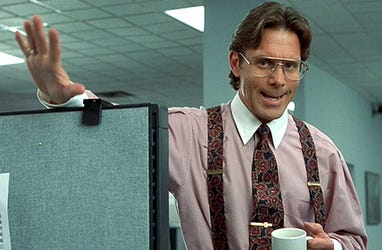Hi,
Welcome to Big, a newsletter about the politics of monopoly. If you’d like to sign up, you can do so here. Or just read on…
Sorry for being absent for a few days, I’ve been working on two things.
First, I finalized the last details of my book, Goliath: The Hundred Year War Between Monopoly Power and Democracy. It’ll be out in October. Since you read this newsletter and this newsletter is informed by my experiences researching the history of monopoly power over the past five years or so, I think you’ll enjoy it.
Second, I helped draft a report on Facebook’s Libra, what it is, who regulates it, the basics. You can read it here, and send me feedback if you have thoughts. Also, I ended up briefing Congressional staff on Monday, which you can watch below.
And now…
There are many ways to describe the governing regime under which Western commerce and politics has operated since the late 1970s. But the most visceral way is to understand that the basic goal, not necessarily by design, was to put men like the fictional character Bill Lumbergh from the movie Office Space in charge of everything.

I was reminded of Lumbergh yesterday while watching Facebook’s VP in charge of their new crypto project, David Marcus, testifying before the Senate Banking Committee to try and justify the company’s attempt to create a global parallel currency.
Lumbergh is one of the most brilliant and iconic characters of 1990s era cinema. He runs Initech - the generic technology company - through fear, extending control over every aspect of his employees’ lives. He’s a passive aggressive bully to everyone around him, except for the notable exception of the “Bob’s,” two management consultants brought in to lay off employees. Both are named Bob, and are equally greedy, manipulative, and repugnant. Management’s short-sightedness and penchant for micro-management humiliates the engineers, leading to bad engineering choices. One such choice creates an opening for the attempt to steal large sums of money, which animates the plot. An equally passive aggressive manager runs the chain restaurant who humiliates the love interest of the main character. The Bob’s, and Lumbergh, are cultural touchstones today for a reason. Characters like them run our institutions and businesses, and our lives.
It’s not too hard to imagine how Office Space analogizes to Boeing, a company run by engineers taken over by Lumbergh-types in the 1990s. The engineers were pushed aside and humiliated, repeatedly, not just over pay, but over what they really care about, which is the engineering and safety integrity of the machines they create. Short-sighted control-freak management can boost stock in the short-term, but ultimately, planes fall out of the sky. This is true for Hollywood as well, where creativity is slowly being drained out of films as the suits dominate the creatives. Which brings me back to the Libra experiment, and the hearings yesterday and today.
I was reminded of Bill Lumbergh because Facebook’s David Marcus sounded like what I imagine Lumbergh would sound like if he were testifying to Congress (though Marcus has an unspecified European accent.) Marcus was polite, smooth, evasive, and passive aggressive. Such powerful executives are common in D.C., and usually Congress treats them with deep respect, even reverence.
Though Marcus is clearly talented, and normally such a man from such a powerful company would have Congress eating out of the palm of his hand, the hearings did not go well for Facebook. Senator Sherrod Brown started out by saying that Facebook was like a toddler playing with matches, and has a record of committing “arson,” calling each instance of arson a “learning experience.” It got worse from there. Republican Senator Martha McSally was openly angry and sarcastic over Facebook’s gall in launching the project, and Republican Senator John Kennedy meticulously went through Facebook’s litany of lies around data. Senator Pat Toomey, who is quite friendly to Facebook, asked how it is that the Libra Reserve, which may pay large dividends to investors, is chartered as a nonprofit.
Democratic Senator Bob Menendez got from Marcus that the Libra Association may not enforce U.S. sanctions. Jon Tester pressed on the potential for bank runs. Senator Mark Warner spent time asking about whether Facebook would exclude competitors from the payments space, and Marcus, while he said Facebook would support other wallets, implied Facebook would probably be embedding its own wallet into its services. As everyone involved in consumer-oriented network systems knows, such defaults are a key way to dominate markets.
Marcus had no answer to any Congressional concerns. The utter disaster of the Senate hearing is being repeated today in the House Financial Services Committee, where members are deeply unhappy about Facebook’s project. The virtually unanimous wall of frustration will empower and press regulators to become far more aggressive in dealings with Facebook. I suspect the Federal Reserve got the message, and will slow walk the Libra project to an ultimate quiet death.
But I thought the most interesting moment of the hearing was when Hawaii Senator Brian Schatz noted the private conversation he’s had with some of the other 27 members of the Libra Association. This association includes companies like Uber, Mastercard, and VISA, as well as nonprofits like MercyCorps. Facebook has portrayed the Libra Association as a collective, as if Facebook is just one of many voices in this venture. But as Schatz revealed, Facebook’s voice is more like the godfather’s voice in the family. It’s true that it’s just one voice among many, but, you know, it’s also the only voice that matters. Here’s what Schatz said:
“Members of the consortium actually have lots of questions too, similar to the questions that are being offered on this dais and they have great reservations about moving forward but they don't want to be left out because of Facebook's market power.”
In other words, Facebook’s partners are afraid of coming out publicly with reservations for fear of retaliation or fear of being left behind. This is consistent with what the New York Times reported last month.
Facebook’s history with partners has added to their caution. The game-maker Zynga, for example, faced a dramatic loss of revenue after Facebook backed away from a close relationship with the company. Facebook also strained relationships with many publishers last year when it changed the algorithms behind its news feed to de-emphasize news stories.
I’ve written before about the wave of terror in American commerce. From low-paid workers to coders to aerospace engineers to venture capitalists all the way to large companies like VISA, fear is now pervasive. Earlier this month, Bloomberg reported on the wave of tech IPO’s, and how the market power of Amazon and Google looms over basically of them. This fear is coming from the concentrated market structures that allow these kinds of companies to set the terms and conditions for all businesses that use their essential services.
Both parties, starting in the late 1970s, decided to place power over our industrial commons into the hands of financiers, because leaders and Americans broadly believed, for good reason, that our corporate structures were faltering and needed radical change. Part of this project involved allowing financiers to structure markets into monopolies, part of it involved transferring the power to set market rules from public institutions to private monopolies.
We are now forty years into this experiment. And the shift of sovereignty from democratic bodies to autocratic ones was on display in the hearing over Facebook’s Libra in a particularly overt way. And that is why Marcus reminded me so much of Bill Lumbergh. He was polite and disdainful, passive aggressive and dishonest, untrustworthy yet all-powerful.
The question is no longer whether we want Bill Lumbergh-types running our corporations. It’s whether they will start governing every facet of our society. With the anger of our political leaders at this naked power-grab by Facebook, I’m hopeful. The answer appears to be no. And this moment might be where we begin to roll back the monopoly friendly-policies and politics that have eroded our ability to create great things and live in a free society.
Thanks for reading. And if you liked it, you can sign up here for more issues of Big, a newsletter on how to restore fair commerce, innovation and democracy.
cheers,
Matt Stoller

